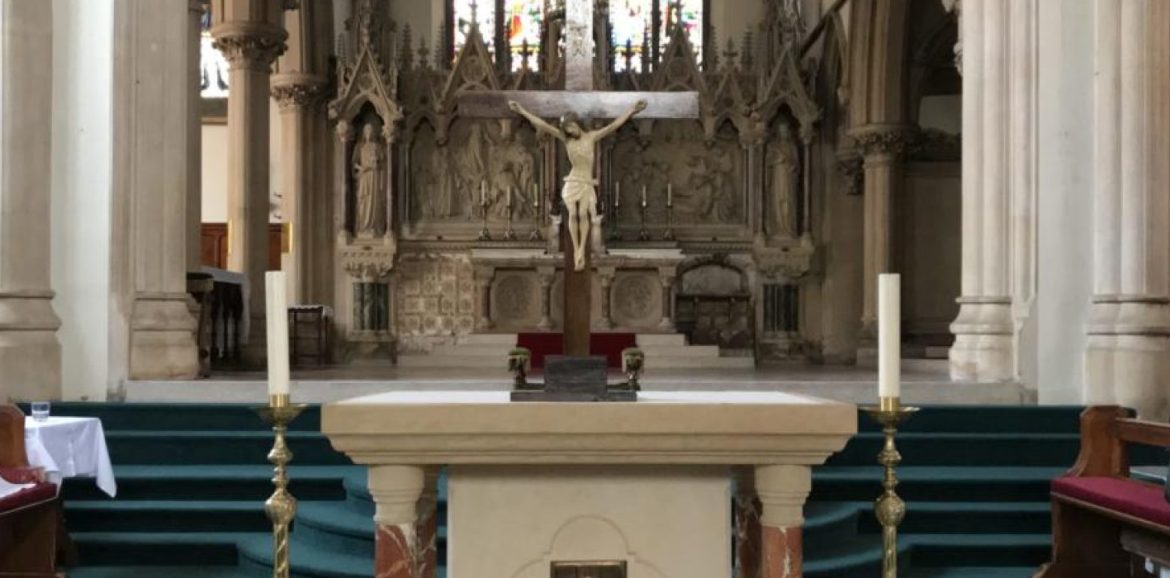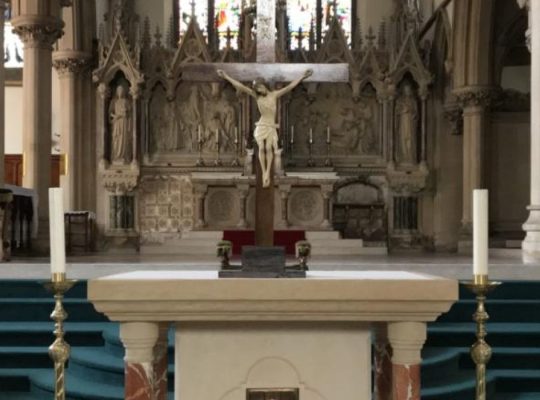Welcome to the Second Sunday—the Octave day of Easter, also known as Divine Mercy Sunday. Today, as commanded by our Lord we celebrate the Feast of Divine Mercy. What’s interesting about today is that after the trials and tribulations of the Easter Triduum where Jesus, giving his all on the cross for mankind, and reversing the disastrous effects of sin with his victory over death, he gives us even more. Through his passion, we are already reconciled to the Father, with all the supernatural gifts bestowed on our first parents restored. We have the Holy Eucharist and the Church, along with all the other sacraments, so what more can he give? In our finite minds our loving God has already given us everything.
In today’s Gospel we see the apostles receiving the authority to carry on Jesus’ mission, being sent out to forgive sins and teach all nations. So, what is it that he gives us today? This Sunday we are given the opportunity to wipe the slate clean, to have all our sins forgiven, along with the punishments they deserve forgotten, and never called to mind. ‘Though your sins be like scarlet, they shall be as white as snow’ We are given also the opportunity to become true apostles of his Divine Mercy. Our Lord tells Saint Faustina to: ‘Tell souls, not to place within their own hearts obstacles to his mercy, which so greatly wants to act within them.’ ‘My Mercy’ he says ‘works in all those hearts which open their doors to it……..’ In return we are called to trust in Jesus and trust in his mercy, so that we can pass it on to our brothers and sisters. ‘Merciful Jesus, we believe in you and we trust in you. Come to the aid of our weakness and incapacity. Grant that we may be able to make you known and loved by all and confident in the immensity of your love we may combat the evil which is in us and all the world, for your glory and our salvation. Amen.’ We see also in our readings today a glimmer of what the ideal Christian life should consist.
The second ‘summary’ in the Acts of the Apostles focuses on the common possession of goods, which shows just how radical the perfect Christian community must be. This practice is an ideal always to be kept in mind and therefore a goal even if it is not a legal obligation. Luke illustrates this with two examples. The first—edifying—is that of Joseph, ‘also named by the apostles Barnabas (which is translated ‘son of encouragement’), a Levite, a Cypriot by birth [who] sold a piece of property that he owned, then brought the money and put it at the feet of the apostles. The second—scandalous— is that of Ananias and Sapphira. They had some property that they sold in order, so they said, to give the money to the apostles. But, before doing so, they kept back some of the proceeds, though they claimed they had given everything. They lied not to the community but to God; they put the Spirit of the Lord to the test: would he notice their deception? On hearing Peters rebuke, first Ananias and then his wife fell down and died. It was their fraud that punished them, for the community had laid no obligation on them to sell their property. Having sold it, they were free to do with the money as they wished, according to Peter. To give up some of one’s wealth, to offer the community a share in ones’ earnings, and especially to go so far as to give all one possesses, has always been and will always be, in the Church’s eyes, a freely made decision, and a great work of mercy. Only the Holy Spirit can suggest it to someone as an inescapable duty, while he also grants the strength to fulfil it joyfully. ‘God loves a cheerful giver.’
Nevertheless, as we know perfectly well—money creates formidable barriers between people everywhere, including those within the Christian community: Luke is particularly sensitive to this unjust, not to say sacrilegious fact, that runs counter to the will of God, who created the world and its riches for the enjoyment of all. No one is a proprietor, in the strict sense, even of his legitimately owned goods, but merely their manager.
The Book of Acts does not hold up the Christian community as a model for solving the problem of an inequitable distribution of goods through the sharing of wealth. But it is a pointed reminder that there must be a solidarity between rich and poor of such a kind that the surplus of the former is used to help alleviate the poverty of the latter. ‘There was no needy person among them…….[for distribution was made] each according to need.’ In fact, ‘If one shares what one has, it is not so that one may become poor, but so that there may be no poor in the community. A community would not be worthy of the name if some of its members lived in plenty while others lacked necessities. Thus, the koinonia undertakes the concrete practice of sharing to assure that everyone’s needs are met.’ Christian communities and each of their members must be mindful of the ancient divine precept: ‘There should be no one of you in need.’ (Deut 15:4)
‘If a brother or sister has nothing to wear and no food for the day, and you say to them, ‘Goodbye and good luck! Keep warm and well fed,’ but do not meet their bodily needs, what good is that? So it is with the faith that does nothing in practice. It is thoroughly lifeless. To such a person one might say, ‘You have faith and I have works—is that it?’ Show me your faith without works, and I will show you the faith that underlies my works.’ (Jas 2:15-18)
The Christian attitude toward riches and the duty of sharing them is not based on any reasons of justice or political expediency, but the demands of faith. The Christian tradition perpetually repeats, teaches, and preaches this. ‘You shall not turn away the needy, but share all your wealth with your brother, claiming nothing for yourself; for if you share immortality with him, all the more should you do so in perishable things.’ (Didache)
The Father’s took this teaching of the apostolic Church and based on it sometimes harsh exhortations to the rich.
‘They proclaim themselves masters of all the common goods they hoard, because they were the first to own them. If every one of them kept only what he required for his immediate needs, and if the surplus was given to the poor, wealth and poverty would be abolished…..You are not a thief? You have taken for your own the goods of which you were supposed to be the caretaker…..To the hungry belongs the bread you have. To the naked belongs the cloak that is hidden in your trunk. To the footsore, the shoes rotting in your house. To the poor, the money you have buried in the earth. How can you oppress so many people that you could help?’ (Saint Basil 329-79)
This does not mean that all forms of ownership are reprehensible. What the Fathers condemned was the inequitable distribution of goods. But still today, many voices are raised in the Church, voices of bishops, priests, laypeople denouncing the abuse of hoarded wealth, reminding Christians everywhere of their prophetic duty in this matter. The ideal picture presented by Acts is the reference point to which one must constantly look in evaluating personal and community practice, while praying that the Holy Spirit will give to those who adhere to the faith ‘one heart and one mind.’
On this Feast of Divine Mercy, as we receive the many gifts God has to give us, we are called to be merciful to our brothers and sisters, and to perform acts of mercy. Perhaps a little sharing is called for!
Happy Feast!


